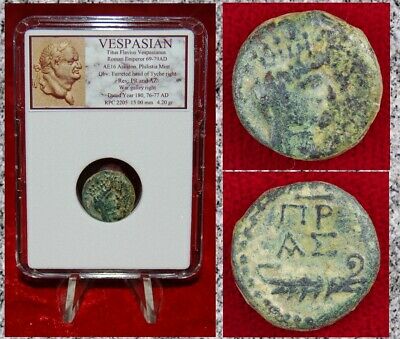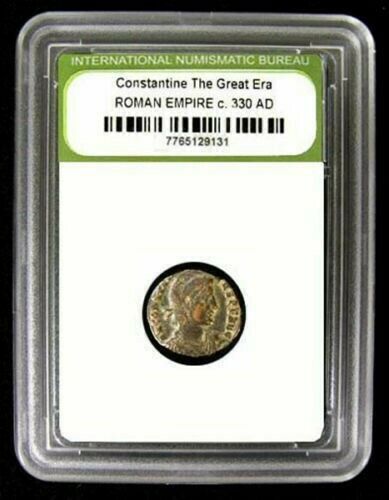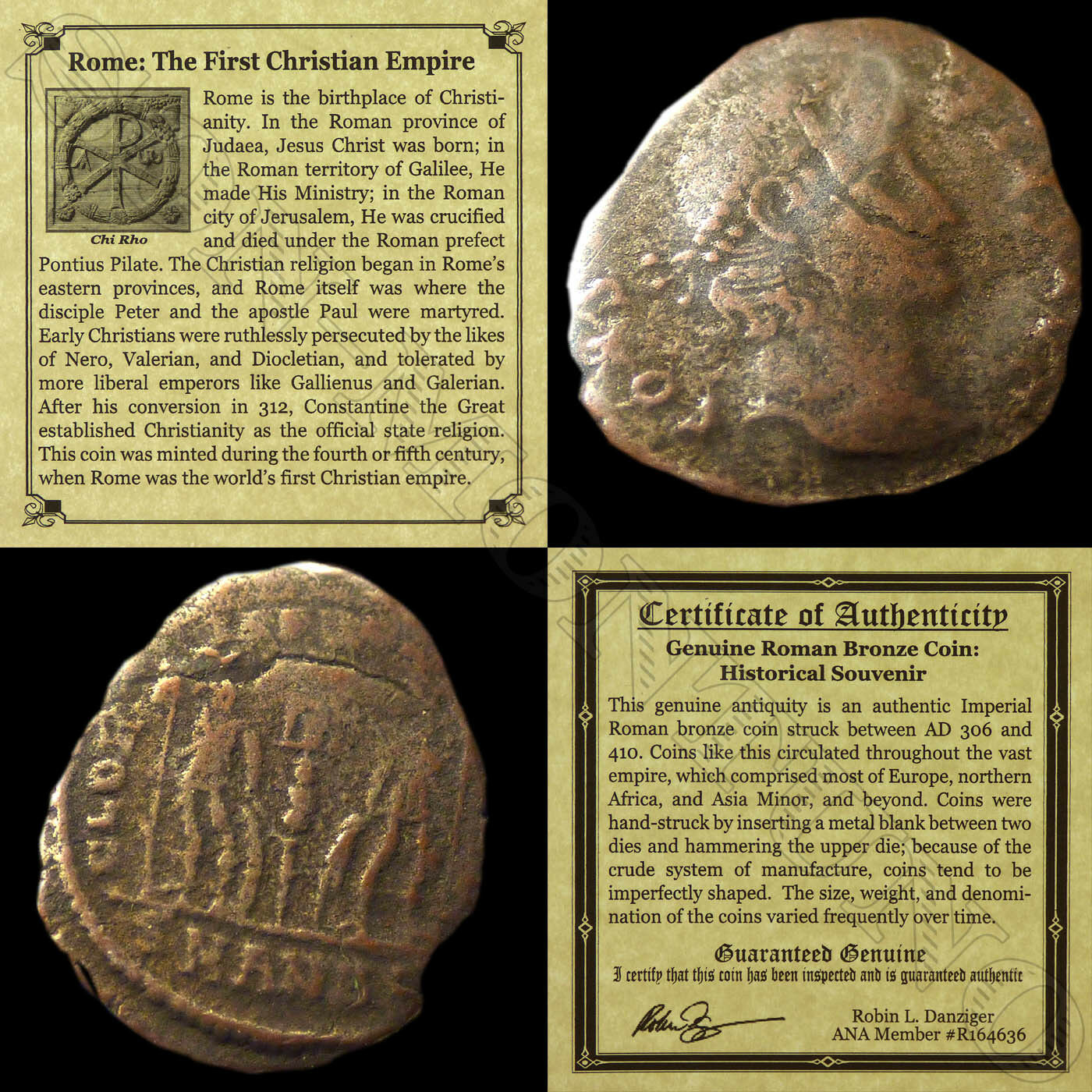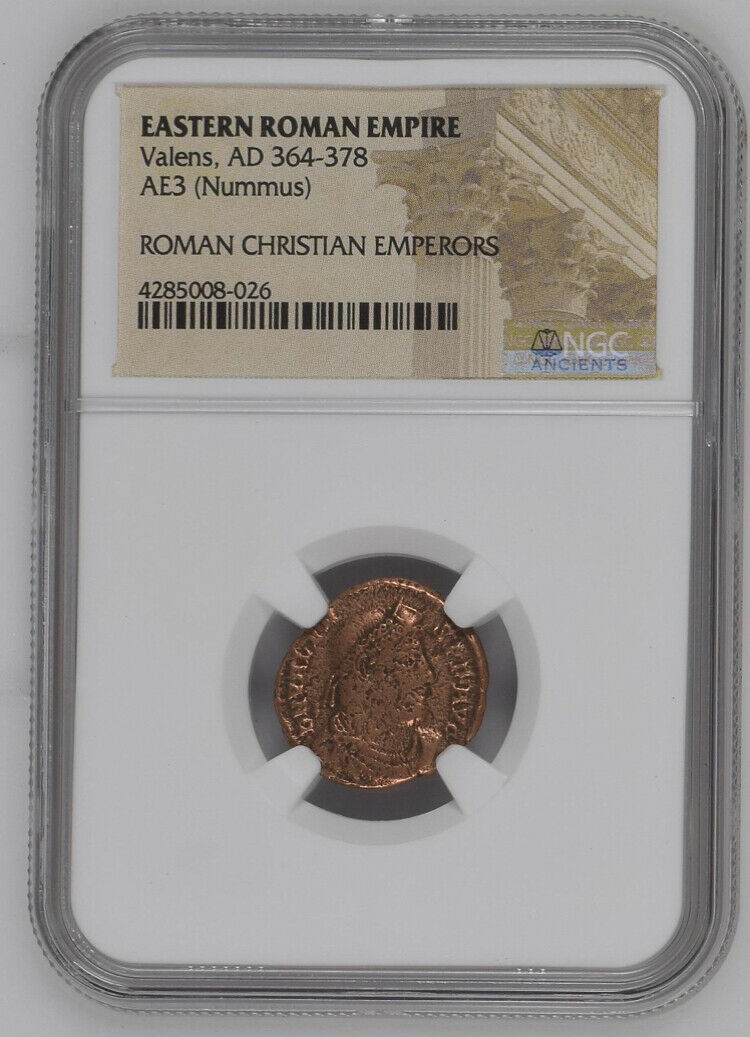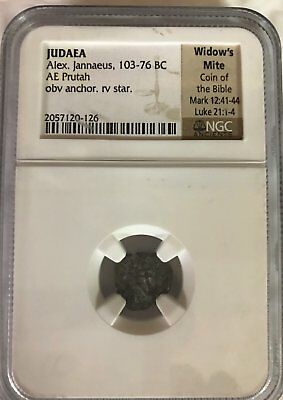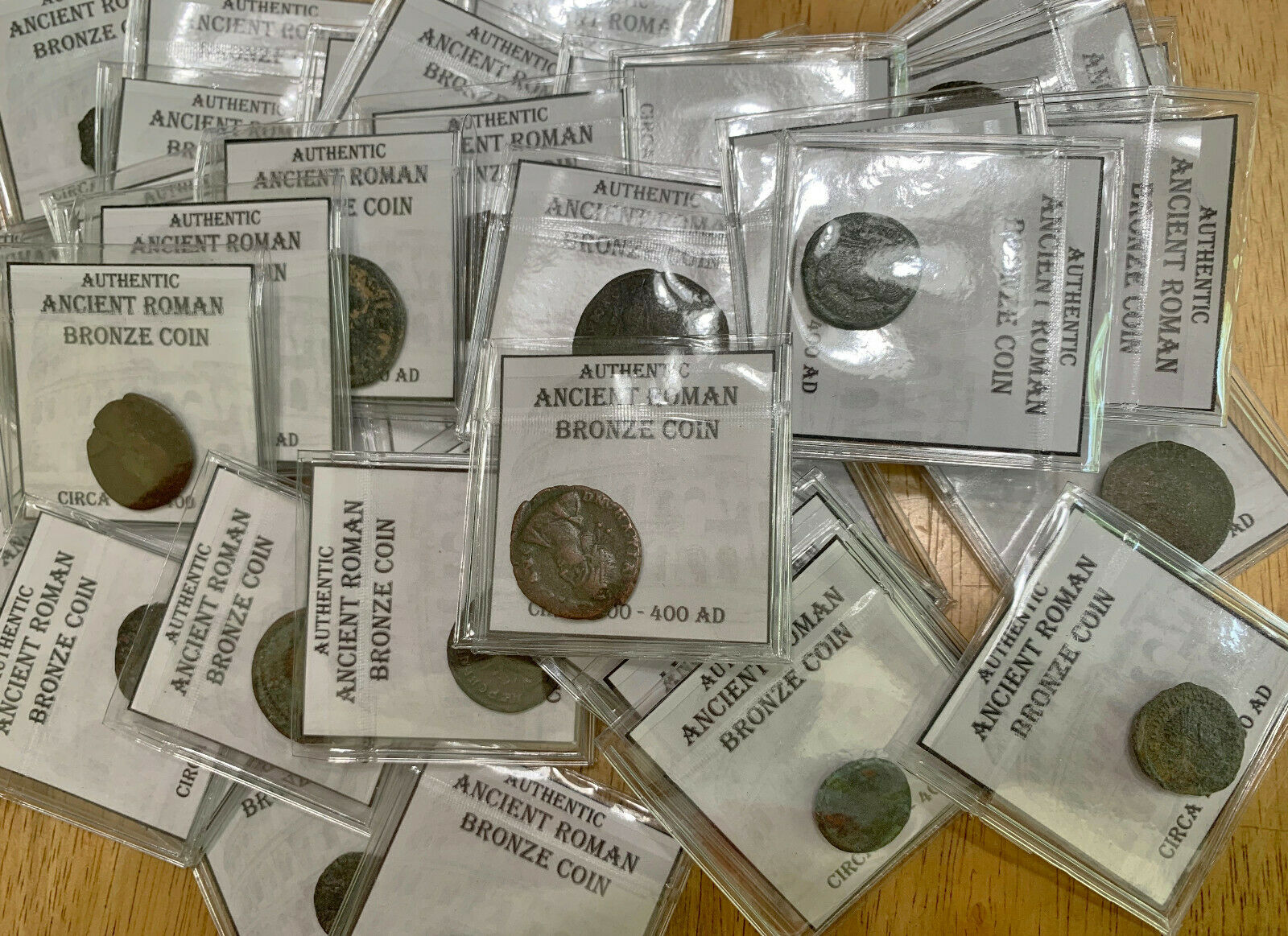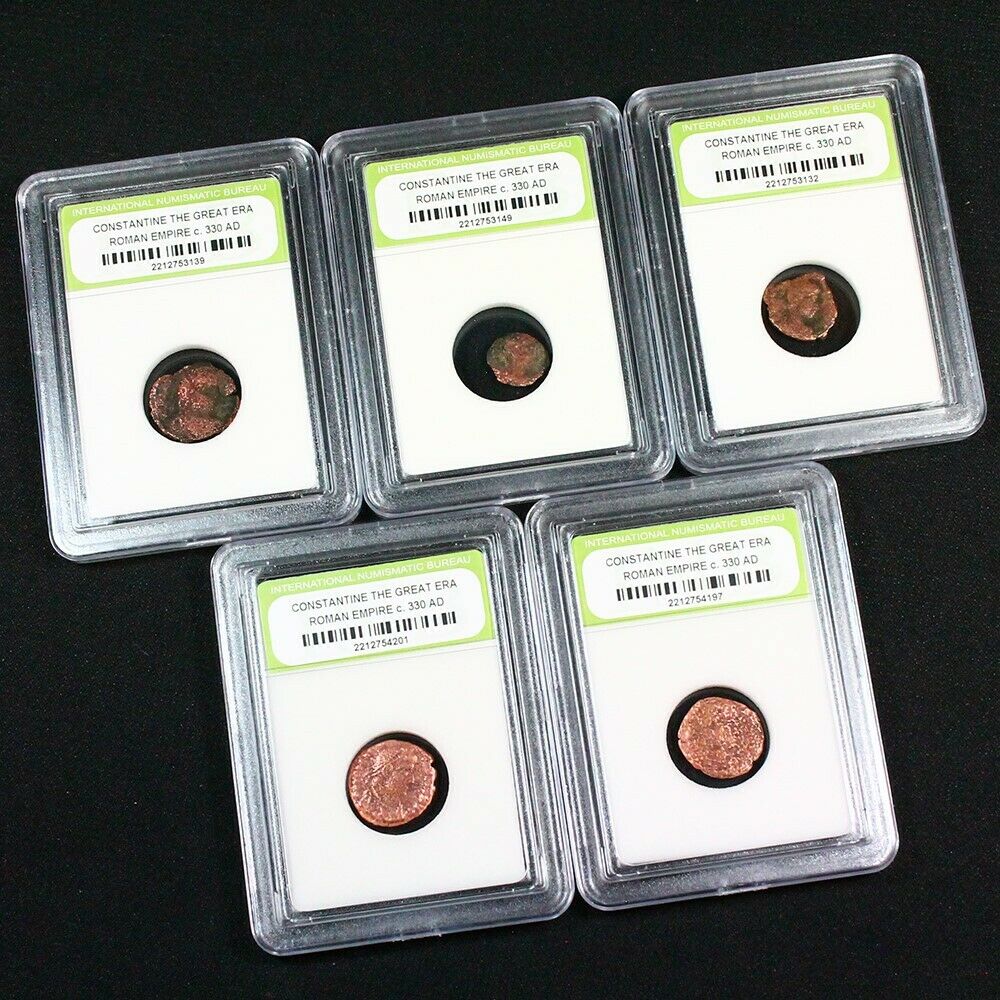-40%
Ancient Roman Empire Coin VESPASIAN Ackalon Philistia Mint War Galley
$ 34
- Description
- Size Guide
Description
<div style="text-align:center"><img src="https://ti2.auctiva.com/sw/java.gif" border="0"><br><table align="center"><tr><td><a style="text-decoration:none" href="https://emporium.auctiva.com/timelessthing" target="_blank"><img src="https://ti2.auctiva.com/sw/browse1.gif" border="0"></a></td><td height="23px" valign="middle" align="center"><font face="arial" size="2"><b><a href="https://emporium.auctiva.com/timelessthing" target="_blank">timelessthing</a> Store</b></font></td></tr></table></div><img src="https://ti2.auctiva.com/web/aswCredit.gif" border="0"><br><a href="https://www.auctiva.com/?how=scLnk1" target="_blank"><img src="https://ti2.auctiva.com/images/sc1line1.gif" border="0"></a>
ROMAN EMPIRE
Ancient Coin
AE16
Ascalon, Philistia
Of
VESPASIAN
Titus Flavius Vespasianus
Roman Emperor 69 A.D. -79 A.D.
Obv:
Turreted head of Tyche right
Obv: PR and AZ
War galley right
15.00 mm
PRIVATE
ANCIENT COINS COLLECTION
SOUTH FLORIDA ESTATE SALE
( Please, check out other ancient coins we have available for sale. We are offering 1000+ ancient coins collection)
ALL COINS ARE GENUINE
LIFETIME GUARANTEE
AND PROFESSIONALLY ATTRIBUTED
The attribution label is printed on archival museum quality paper
An interesting coin of Vespasian minted in Ascalon. The bust of Tyche on obverse and war galley on reverse.
This coin comes with display case, stand and attribution label printed on museum quality paper attached as pictured. A great way to display an ancient coins collection! You are welcome to ask any questions prior buying or bidding. We can ship it anywhere within continental U.S. for a flat rate of 6.90$. It includes shipping, delivery confirmation and packaging material.
Limited Time Offer:
FREE SHIPPING
(only within the continental U.S.)
The residents of HI/AK/U.S. Territories and International bidders/buyers must contact us for the shipping quote before bidding/buying
VESPASIAN
Latin: Titus Flavius Caesar Vespasianus Augustus;[1] 17 November 9 – 23 June 79), was Roman Emperor from 69 AD to 79 AD. Vespasian was the founder of the Flavian dynasty, which ruled the Empire for a quarter century. Vespasian was descended from a family of equestrians, who rose into the senatorial rank under the Emperors of the Julio-Claudian dynasty. Although he attained the standard succession of public offices, holding the consulship in 51 AD, Vespasian became more reputed as a successful military commander, participating in the Roman invasion of Britain in 43,and subjugating Judaea during the Jewish rebellion of 66 AD.
While Vespasian was preparing to besiege the city of Jerusalem during the latter campaign, emperor Nero committed suicide, plunging the empire into a year of civil war known as the Year of the Four Emperors. After the emperors Galba and Otho perished in quick succession, Vitellius became Emperor in April 69 AD. In response, the armies in Egypt and Judaea declared Vespasian emperor on July 1. In his bid for imperial power, Vespasian joined forces with Mucianus, the governor of Syria, and Primus, a general in Pannonia. Primus and Mucianus led the Flavian forces against Vitellius, while Vespasian gained control of Egypt. On 20 December, Vitellius was defeated, and the following day Vespasian was declared Emperor by the Roman Senate.
Little information survives about the government during the ten years Vespasian was emperor. His reign is best known for financial reforms following the demise of the Julio-Claudian dynasty, the successful campaign against Judaea, and several ambitious construction projects, such as the Colosseum. Upon his death in 79, he was succeeded by his eldest son Titus, thus becoming the first Roman Emperor to be directly succeeded by his own son.
Family
Vespasian was born in Falacrina, in the Sabine country near Reate. His family was relatively undistinguished and lacking in pedigree. His paternal grandfather, Titus Flavius Petro, was the first to distinguish himself, rising to the rank of centurion and fighting at Pharsalus for Pompey in 48 BC. Subsequently he became a debt collector. Petro's son, Titus Flavius Sabinus, worked as a customs official in the province of Asia and became a money-lender on a small scale among the Helvetii. He gained a reputation as a scrupulous and honest "tax-farmer". Sabinus married up in status, to Vespasia Polla, whose father had risen to prefect of the camp and whose brother became a Senator. Sabinus and Vespasia had three children, the eldest of whom, a girl, died in infancy. The elder boy, Titus Flavius Sabinus entered public life and pursued the cursus honorum. He served in the army as a military tribune in Thrace in 36. The following year he was elected quaestor and served in Crete and Cyrene. He rose through the ranks of Roman public office, being elected aedile on his second attempt in 39 and praetor on his first attempt in 40, taking the opportunity to ingratiate himself with the Emperor Caligula.
The younger boy, Vespasian, seemed far less likely to be successful, initially not wishing to pursue high public office. He followed in his brother's footsteps when driven to it by his mother's taunting.[citation needed] During this period he married Flavia Domitilla, the daughter of Flavius Liberalis from Ferentium and the mistress of Statilius Capella, a Roman knight. They had two sons, Titus Flavius Vespasianus (b. 41) and Titus Flavius Domitianus (b. 51), and a daughter, Domitilla (b. 39). His wife Domitilla and his daughter Domitilla both died before Vespasian became Emperor in 69. After the death of his wife, Vespasian 's longstanding mistress, Antonia Caenis, became his wife in all but formal status, a relationship that survived until she died in 75.
Early career
In preparation for a quaestorship, Vespasian needed two periods of service in the minor magistracies, one military and the other public. Vespasian served in the military in Thrace for about 3 years. On his return to Rome in about 30, he obtained a post in the vigintivirate, the minor magistracies, most probably in one of the posts in charge of street cleaning.His early performance was so unsuccessful that Caligula reportedly stuffed handfuls of muck down his toga to correct the uncleaned Roman streets, formally his responsibility. During the period of the ascendancy of Sejanus, there is no record of Vespasian's significant activity in political events. After completion of a term in the vigintivirate, Vespasian was entitled to stand for election as quaestor; a senatorial office. But his lack of political or family influence meant that Vespasian served as quaestor in one of the provincial posts in Crete, rather than as assistant to important men in Rome.
Next he needed to gain a praetorship, carrying the Imperium, but non-patricians and the less well-connected had to serve in at least one intermediary post as an aedile or tribune. Vespasian failed at his first attempt to gain an aedileship but was successful in his second attempt, becoming an aedile in 38. Despite his lack of significant family connections or success in office, he achieved praetorship in either 39 or 40, at the youngest age permitted (30), during a period of political upheaval in the organisation of elections. His longstanding relationship with freedwoman Antonia Caenis, confidential secretary to the Emperor's grandmother and part of the circle of courtiers and servants round the Emperor, may have contributed to his success.
Invasion of Britannia
Upon the accession of Claudius as emperor in 41, Vespasian was appointed legate of Legio II Augusta, stationed in Germania, thanks to the influence of the Imperial freedman Narcissus. In 43, Vespasian and the II Augusta participated in the Roman invasion of Britain, and he distinguished himself under the overall command of Aulus Plautius. After participating in crucial early battles on the rivers Medway and Thames, he was sent to reduce the south west, penetrating through the modern counties of Hampshire, Wiltshire, Dorset, Somerset, Devon and Cornwall with the probable objectives of securing the south coast ports and harbours along with the tin mines of Cornwall and the silver and lead mines of Somerset.
Vespasian marched from Noviomagus Reginorum (Chichester) to subdue the hostile Durotriges and Dumnonii tribes,captured twenty oppida (towns, or more probably hill forts, including Hod Hill and Maiden Castle in Dorset). He also invaded Vectis (the Isle of Wight), finally setting up a fortress and legionary headquarters at Isca Dumnoniorum (Exeter). During this time he injured himself and had not fully recovered until he went to Egypt. These successes earned him triumphal regalia (ornamenta triumphalia) on his return to Rome.
Later political career
His success as the legate of a legion, earned him a consulship in 51 after which he retired from public life, having incurred the enmity of Claudius' wife, Agrippina.He came out of retirement in 63 when he was sent as governor to Africa Province. According to Tacitus (ii.97), his rule was "infamous and odious" but according to Suetonius (Vesp. 4), he was "upright and, highly honourable". On one occasion he was pelted with turnips. Vespasian used his time in North Africa wisely. Usually governorships were seen by ex-consuls as opportunities to extort huge amounts of money to regain their wealth that they had spent on their previous political campaigns. Corruption was so rife, that it was almost expected that a governor would come back from these appointments with his pockets full. However, Vespasian used his time in North Africa making friends instead of money; something that would be far more valuable in the years to come. During his time in North Africa, he found himself in financial difficulties and was forced to mortgage his estates to his brother. To revive his fortunes he turned to the mule trade and gained the nickname mulio (mule-driver).
Great Jewish Revolt
However, in 66, Vespasian was appointed to suppress the Great Jewish Revolt in Judaea. A revolt there had killed the previous governor and routed Cestius Gallus, the governor of Syria, when he tried to restore order. Two legions, with eight cavalry squadrons and ten auxiliary cohorts, were therefore dispatched under the command of Vespasian while his elder son, Titus, arrived from Alexandria with another. During this time he became the patron of Flavius Josephus, a Jewish resistance leader captured at the Siege of Yodfat who would go on to write his people's history in Greek. In the end, thousands of Jews were killed and many towns destroyed by the Romans who successfully re-established control over Judea. They took Jerusalem in 70. He is remembered by Josephus, in his "Antiquities of the Jews" as a fair and humane official, in contrast to the notorious Herod the Great whom Josephus goes to great lengths to demonize.
Josephus, while under the patronage of the Roman Emperor, wrote that after the Roman Legio X Fretensis accompanied by Vespasian destroyed Jericho on 21 June 68, he took a group of Jews who could not swim (possibly Essenes from Qumran), fettered them, and threw them into the Dead Sea to test its legendary buoyancy. Sure enough, the Jews shot back up after being thrown in from boats and floated calmly on top of the sea.
Aftermath of the civil war
Vespasian was declared emperor by the Senate while he was in Egypt in December of 69 (the Egyptians had declared him emperor in June of 69). In the short-term, administration of the empire was given to Mucianus who was aided by Vespasian's son, Domitian. Mucianus started off Vespasian's rule with tax reform that was to restore the empire's finances. After Vespasian arrived in Rome in mid-70, Mucianus continued to press Vespasian to collect as many taxes as possible.
Arrival in Rome and gathering support
In mid-70, Vespasian first came to Rome. Vespasian immediately embarked on a series of efforts to stay in power and prevent future revolts. He offered gifts to many in the military and much of the public.Soldiers loyal to Vitellius were dismissed or punished. He also restructured the Senatorial and Equestrian orders, removing his enemies and adding his allies.Regional autonomy of Greek provinces was repealed. Additionally, he made significant attempts to control public perception of his rule.
Construction and conspiracies
Between 71 and 79, much of Vespasian's reign is a mystery. Historians report that Vespasian ordered the construction of several buildings in Rome. Additionally, he survived several conspiracies against him.
Vespasian helped rebuild Rome after the civil war. He added the temple of Peace and the temple to the Deified Claudius.
In 75, he erected a colossal statue of Apollo, begun under Nero, and he dedicated a stage of the theater of Marcellus. He also began construction of the Colosseum.
Suetonius claims that Vespasian was met with "constant conspiracies" against him.
Only one conspiracy is known specifically, though. In 78 or 79, Eprius Marcellus and Aulus Caecina Alienus attempted to kill Vespasian. Why these men turned against Vespasian is not known.
Vespasian and Mucianus renewed old taxes and instituted new ones, increased the tribute of the provinces, and kept a watchful eye upon the treasury officials. The Latin proverb "Pecunia non olent" ("Money does not smell") may have been created when he had introduced a urine tax on public toilets. By his own example of simplicity of life — he caused something of a scandal when it was made known he took his own boots off — he initiated a marked improvement in the general tone of society in many respects.
In early 70, Vespasian was still in Egypt, the source of Rome's grain supply, and had not yet left for Rome. According to Tacitus, his trip was delayed due to bad weather.Modern historians theorize that Vespasian had been and was continuing to consolidate support from the Egyptians before departingStories of a divine Vespasian healing people circulated in Egypt. During this period, protests erupted in Alexandria over his new tax policies and grain shipments were held up. Vespasian eventually restored order and grain shipments to Rome resumed.
In addition to the uprising in Egypt, unrest and civil war continued in the rest of the empire in 70. In Judea, rebellion had continued from 66. Vespasian's son, Titus, finally subdued the rebellion with the capture of Jerusalem and destruction of the Jewish Temple in 70. According to Eusebius, Vespasian then ordered all descendants of the royal line of David to be hunted down, causing the Jews to be persecuted from province to province. Several modern historians have suggested that Vespasian, already having been told by Josephus that he was prophesied to become emperor whilst in Judaea, was probably reacting to other widely known Messianic prophecies circulating at the time, to suppress any rival claimants arising from that dynasty.
In January of the same year, an uprising occurred in Gaul and Germany, known as the second Batavian Rebellion. This rebellion was headed by Gaius Julius Civilis and Julius Sabinus. Sabinus, claiming he was descended from Julius Caesar, declared himself Emperor of Gaul. The rebellion defeated and absorbed two Roman legions before it was suppressed by Vespasian's brother-in-law, Quintus Petillius Cerialis, by the end of 70.
Returning from Africa, Vespasian toured Greece in Nero's retinue, but lost Imperial favour after paying insufficient attention (some sources suggest he fell asleep) during one of the Emperor's recitals on the lyre, and found himself in the political wilderness.
Military pursuits and death
In 78, Agricola was sent to Britain, and both extended and consolidated the Roman dominion in that province, pushing his way into what is now Scotland. In his ninth consulship Vespasian had a slight illness in Campania and, returning at once to Rome, he left for Aquae Cutiliae and the country around Reate, where he spent every summer; however, his illness worsened and he developed severe diarrhea. On 23 June of 79, Vespasian was on his deathbed and expiring rapidly, he demanded that he be helped to stand as he believed "An emperor should die on his feet". He died of a fever. His purported great wit can be glimpsed from his last words; Væ, puto deus fio, "Oh! I think I'm becoming a god!"
Legacy
Vespasian was known for his wit and his amiable manner alongside his commanding personality and military prowess. He could be liberal to impoverished Senators and equestrians and to cities and towns desolated by natural calamity. He was especially generous to men of letters and rhetors, several of whom he pensioned with salaries of as much as 1,000 gold pieces a year. Quintilian is said to have been the first public teacher who enjoyed this imperial favor. Pliny the Elder's work, the Natural History, was written during Vespasian's reign, and dedicated to Vespasian's son Titus.
Vespasian distrusted philosophers in general, viewing them as unmanly complainers who talked too much. It was the idle talk of philosophers, who liked to glorify the good times of the Republic, that provoked Vespasian into reviving the obsolete penal laws against this profession as a precautionary measure. Only one, Helvidius Priscus, was put to death after he had repeatedly affronted the Emperor by studied insults which Vespasian had initially tried to ignore, "I will not kill a dog that barks at me," were his words on discovering Priscus's public slander.
Vespasian was indeed noted for mildness when dealing with political opposition. According to Suetonius, he bore the frank language of his friends, the quips of pleaders, and the impudence of the philosophers with the greatest patience. Though Licinius Mucianus, a man of disputable reputation as being the receiver in homosexual sex, treated the Emperor with scant respect, Vespasian never criticised him publicly but privately uttered the words: "I, at least, am a man." He was also noted for his benefactions to the people, much money was spent on public works and the restoration and beautification of Rome: a new forum, the Temple of Peace, the public baths and the great show piece, the Colosseum.
Vespasian debased the denarius during his reign, reducing the silver purity from 93.5% to 90% — the silver weight dropping from 2.97 grams to 2.87 grams.
SHIPPING INFO:
- The Shipping Charge is a flat rate and it includes postage, delivery confirmation, insurance up to the value (if specified), shipping box (from 0.99$ to 5.99$ depends on a size) and packaging material (bubble wrap, wrapping paper, foam if needed)
- We can ship this item to all continental states. Please, contact us for shipping charges to Hawaii and Alaska.
- We can make special delivery arrangements to Canada, Australia and Western Europe.
- USPS (United States Postal Service) is the courier used for ALL shipping.
- Delivery confirmation is included in all U.S. shipping charges. (No Exceptions)
CONTACT/PAYMENT INFO:
- We will reply to questions & comments as quickly as we possibly can, usually within a day.
- Please ask any questions prior to placing bids.
- Acceptable form of payment is PayPal
REFUND INFO:
- All items we list are guaranteed authentic or your money back.
- Please note that slight variations in color are to be expected due to camera, computer screen and color
pixels and is not a qualification for refund.
- Shipping fees are not refunded.
FEEDBACK INFO:
- Feedback is a critical issue to both buyers and sellers on eBay.
- If you have a problem with your item please refrain from leaving negative or neutral feedback until you have made contact and given a fair chance to rectify the situation.
- As always, every effort is made to ensure that your shopping experience meets or exceeds your expectations.
- Feedback is an important aspect of eBay. Your positive feedback is greatly appreciated!
<div style="text-align:center"><a style="text-decoration:none" href="https://mostpopular.sellathon.com/?id=AC1019108"><img src="https://www.sellathon.com/Resources/Images/countercredit.gif" border="0"></a></div>
